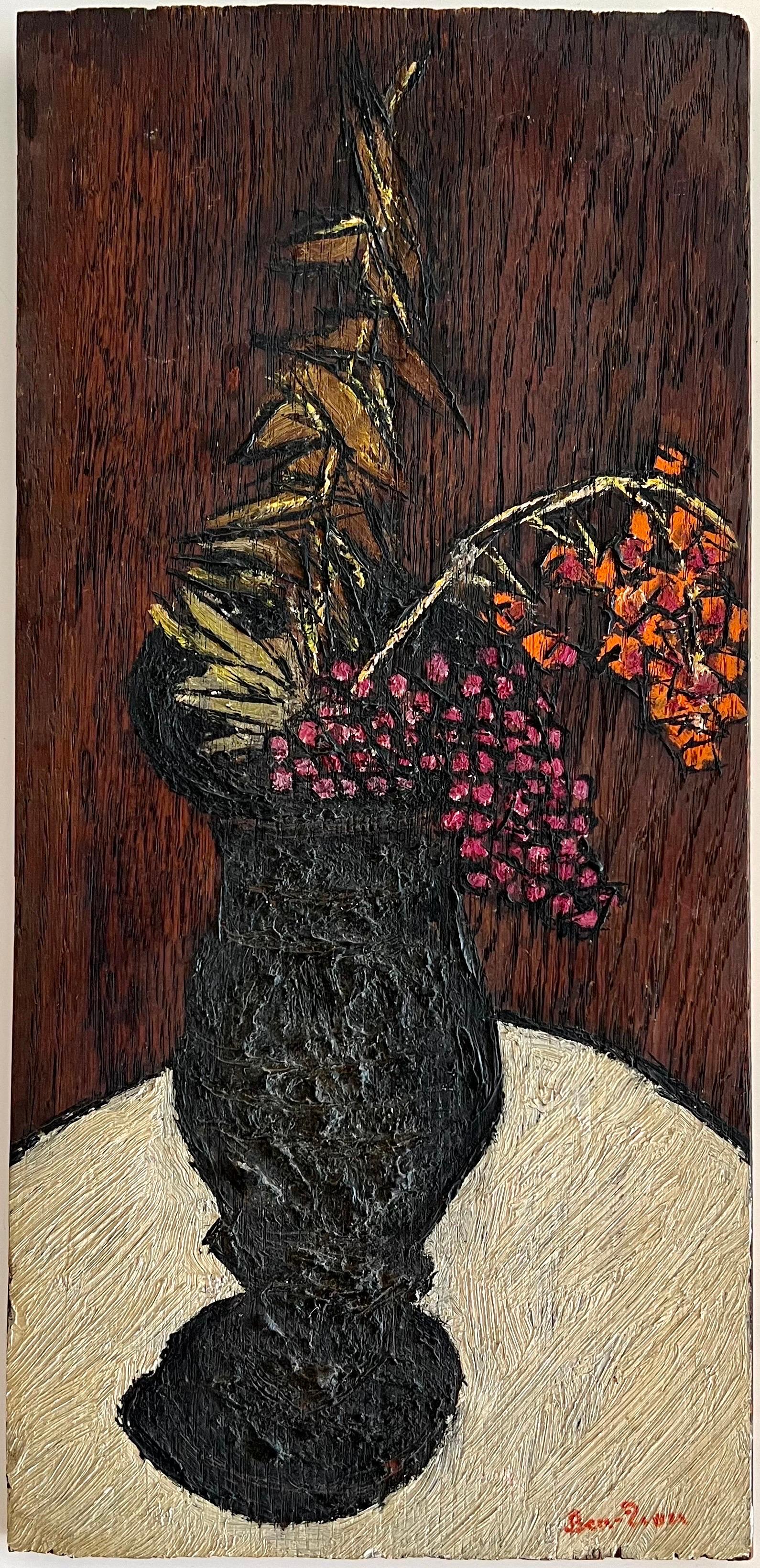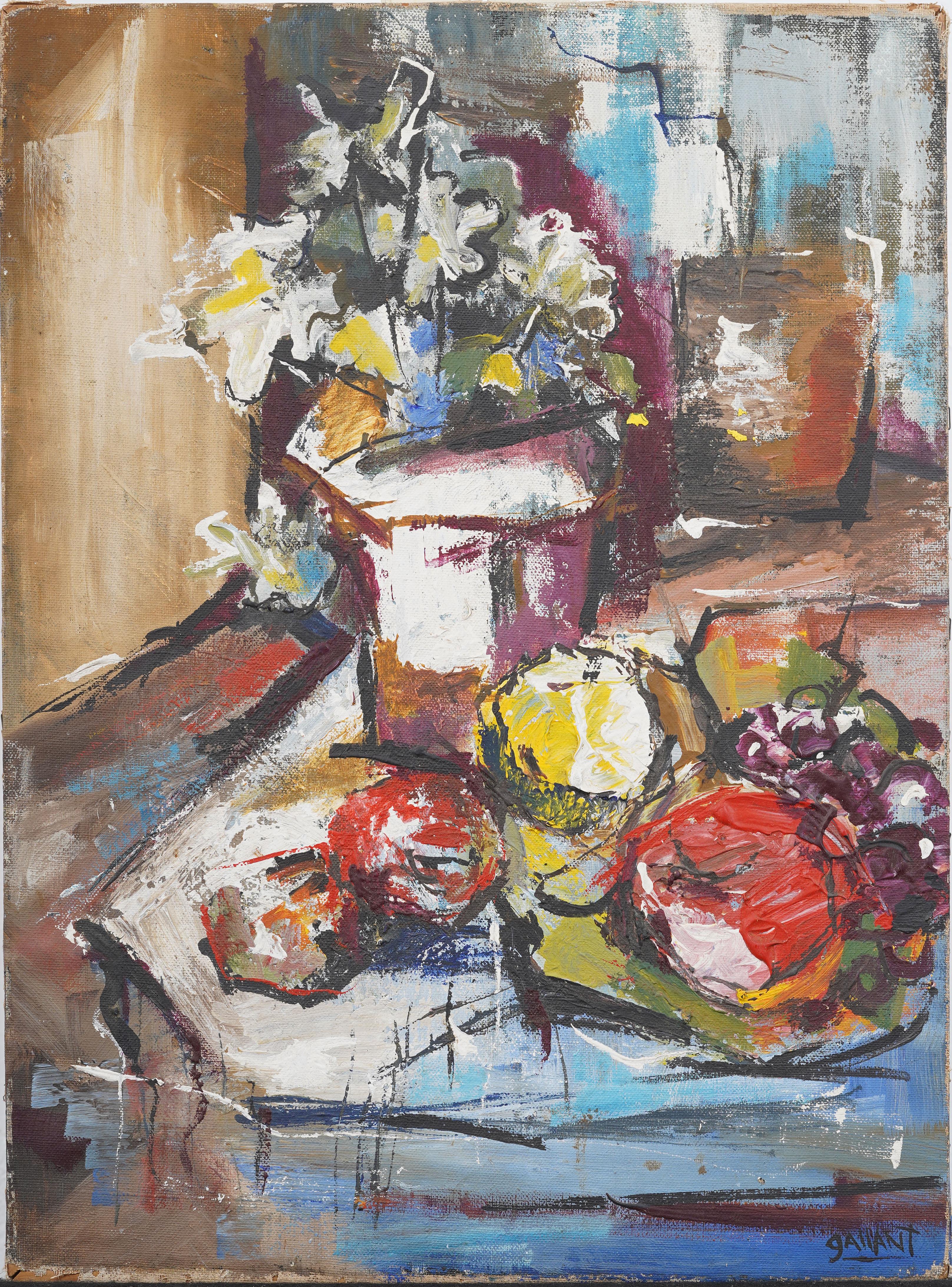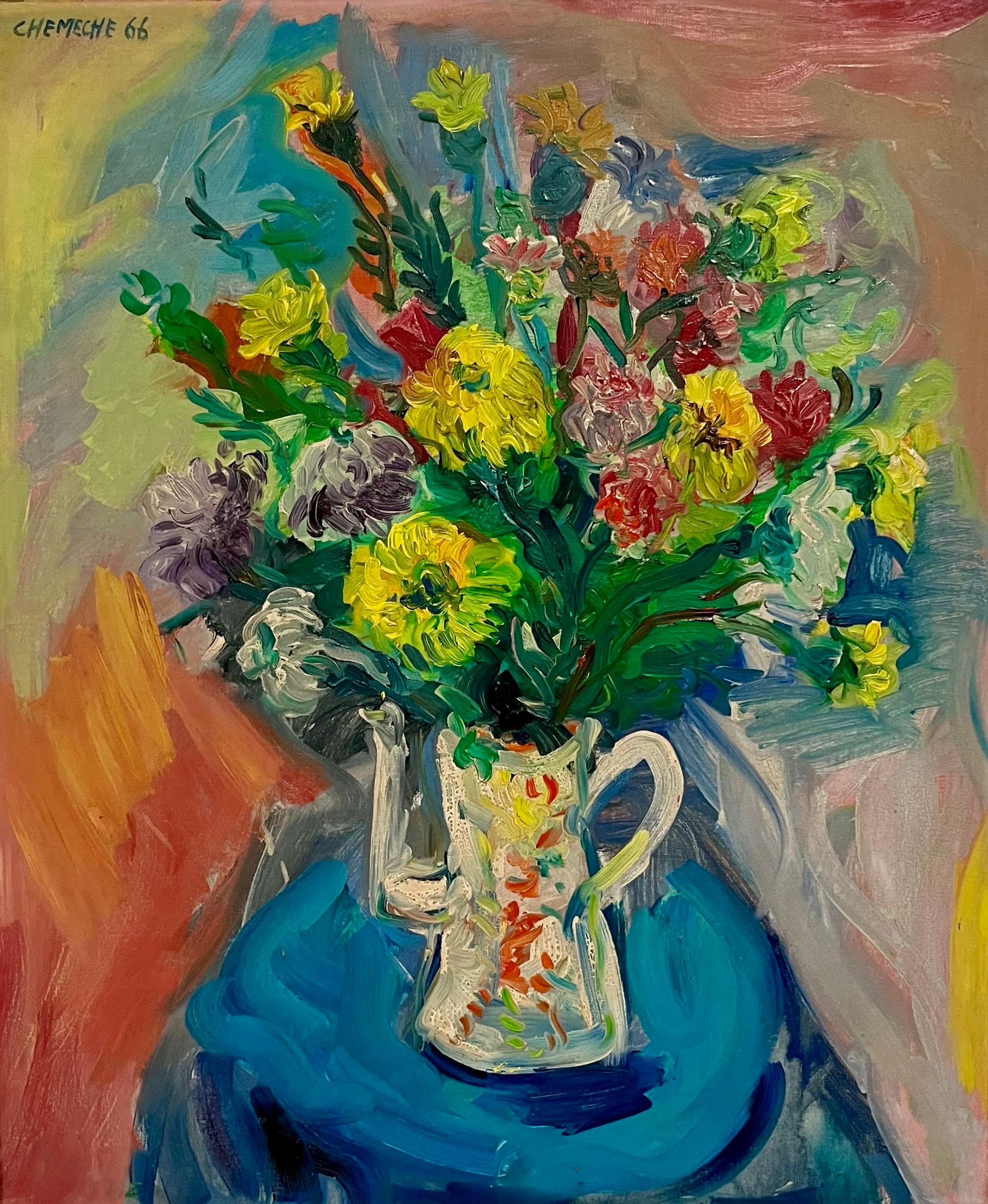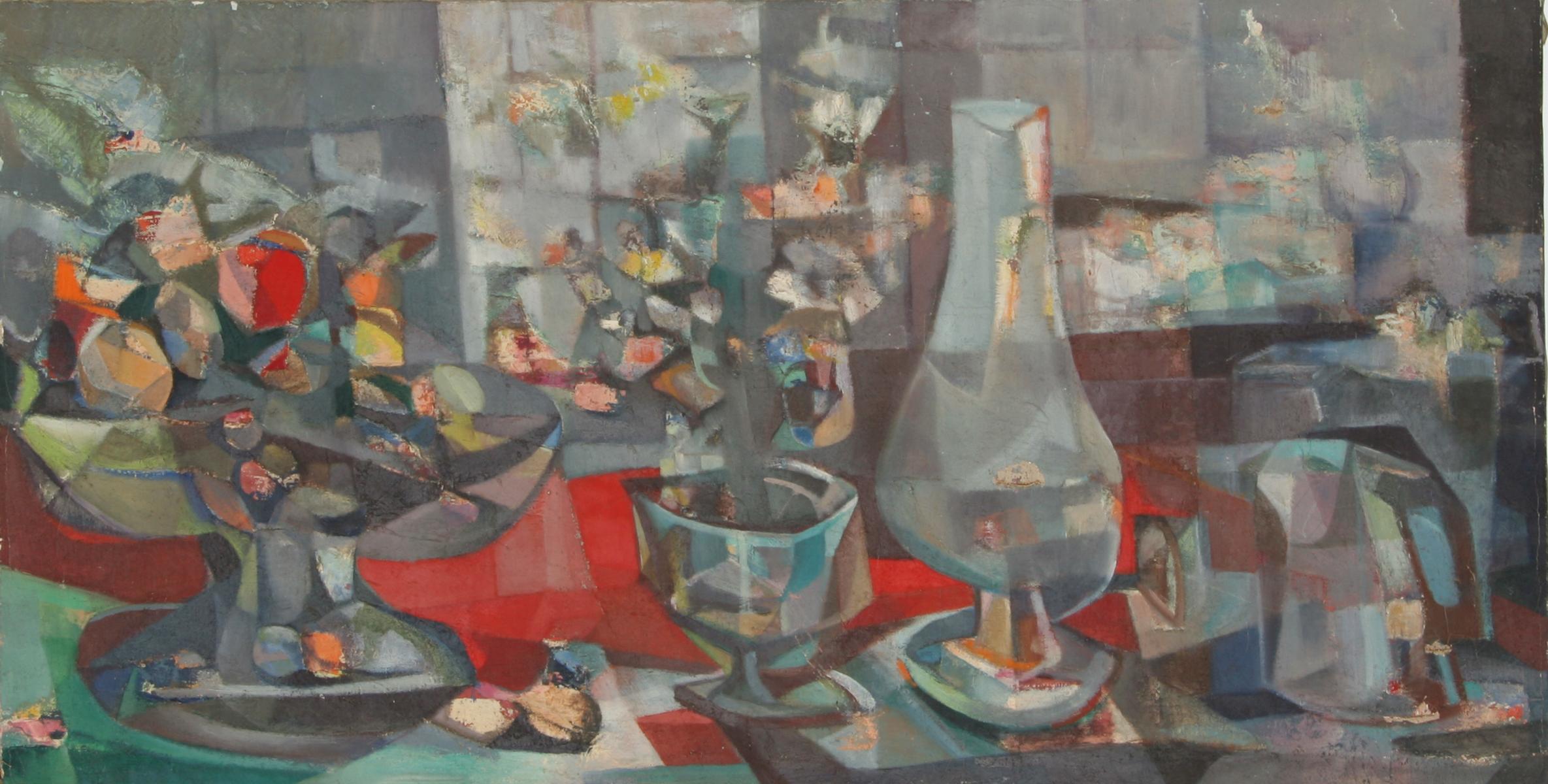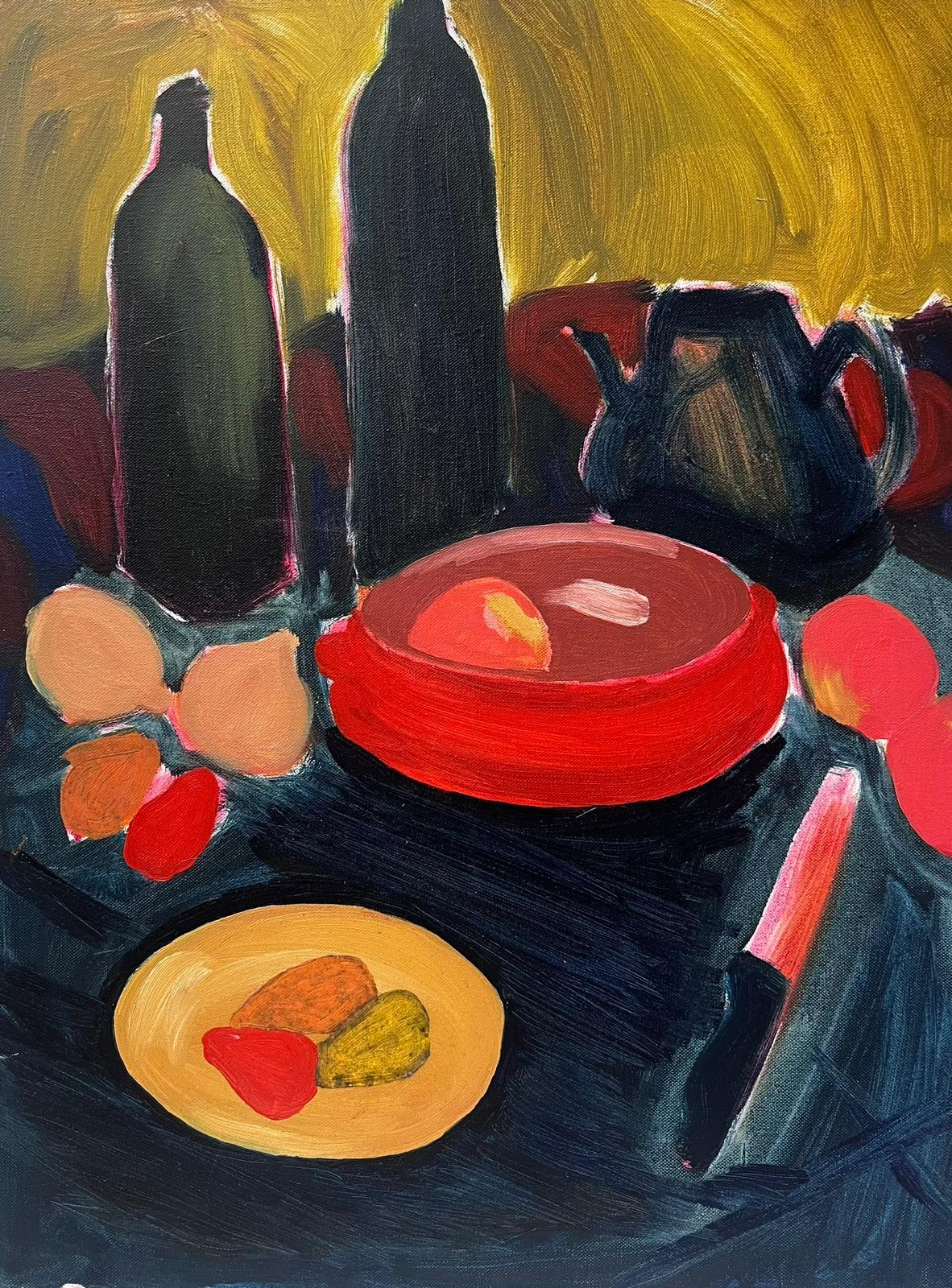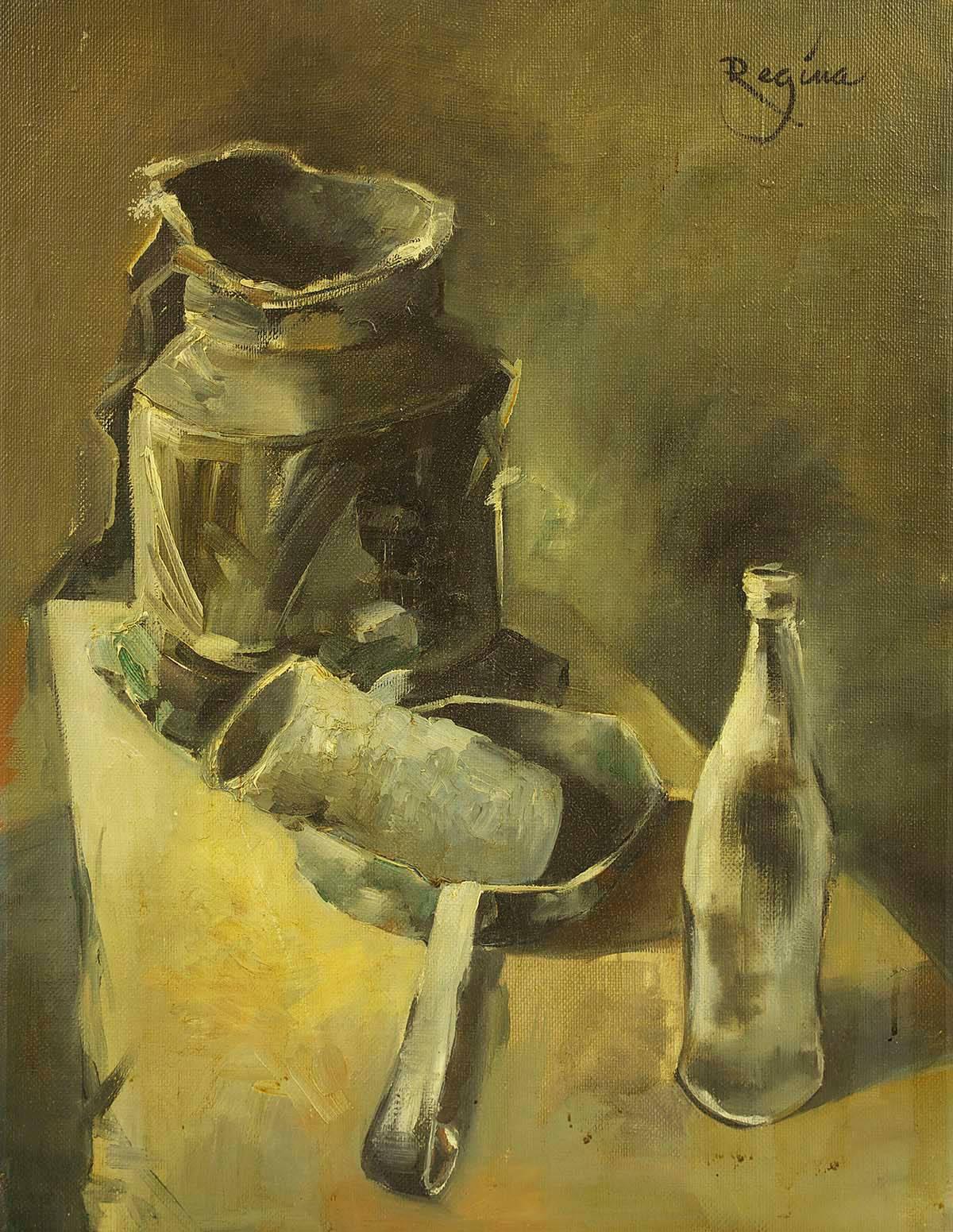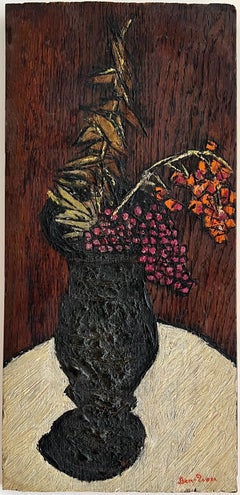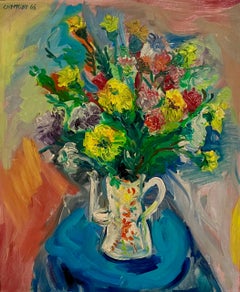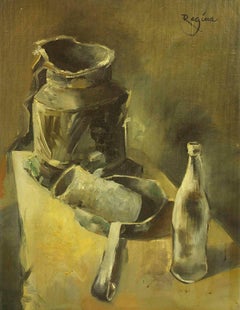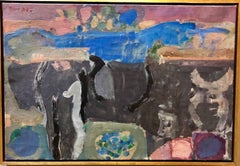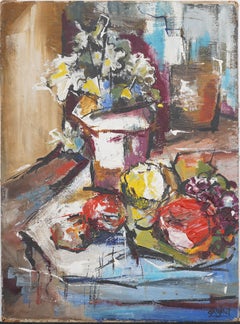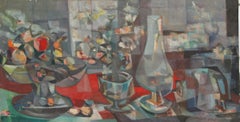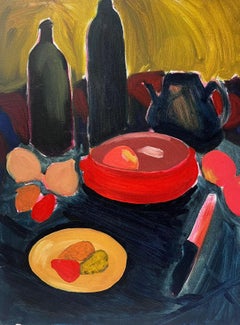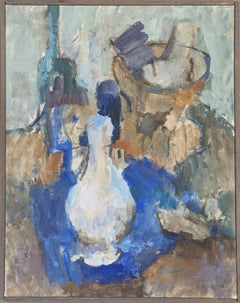Items Similar to Expressionist Judaica Havdalah Oil Painting Jewish American Modernist Ben Zion
Want more images or videos?
Request additional images or videos from the seller
1 of 9
Ben-Zion WeinmanExpressionist Judaica Havdalah Oil Painting Jewish American Modernist Ben Zionc.1950's
c.1950's
$4,500
£3,386.15
€3,914.65
CA$6,354.13
A$6,889.74
CHF 3,656.30
MX$84,855.87
NOK 45,317.56
SEK 42,769.36
DKK 29,219.92
About the Item
Oil Painting of still life Havdalah scene with braided candle, spice tower box and kiddush cup.
Born in 1897, Ben-Zion Weinman celebrated his European Jewish heritage in his visual works as a sculptor, painter, and printmaker. Influenced by Spinoza, Knut Hamsun, and Wladyslaw Reymont, as well as Hebrew literature, Ben-Zion wrote poetry and essays that, like his visual work, attempt to reveal the deep “connection between man and the divine, and between man and earth.” An emigrant from the Ukraine, he came to the US in 1920. He wrote fairy tales and poems in Hebrew under the name Benzion Weinman, but when he began painting he dropped his last name and hyphenated his first, saying an artist needed only one name.
Ben-Zion was a founding member of “The Ten: An Independent Group” The Ten” a 1930’s avant-garde group, Painted on anything handy. Ben-Zion often used cabinet doors (panels) in his work. Other members of group included Ilya Bolotowsky, Lee Gatch, Adolph Gottlieb, Louis Harris, Yankel Kufeld, Marcus Rothkowitz (later known as Mark Rothko), Louis Schanker, and Joseph Solman. The Art of “The Ten” was generally described as expressionist, as this style offered the best link between modernism and social art. Their exhibition at the Mercury Gallery in New York held at the same time as the Whitney Annual Exhibition of Contemporary American Painting, included a manifesto concentrating on aesthetic questions and criticisms of the conservative definition of modern art imposed by the Whitney. Ben-Zion’s work was quickly noticed. The New York Sun said he painted “furiously” and called him “the farthest along of the lot.” And the triptych, “The Glory of War,” was described by Art News as “resounding.”
By 1939, The Ten disbanded because most of the members found individual galleries to represent their work. Ben-Zion had his first one-man show at the Artist’s Gallery in Greenwich Village and J.B. Neumann, the highly esteemed European art dealer who introduced Paul Klee, (among others) to America, purchased several of Ben-Zion’s drawings. Curt Valentin, another well-known dealer, exhibited groups of his drawings and undertook the printing of four portfolios of etchings, each composed of Ben-Zion’s biblical themes. He worked as a WPA artist.
Ben-Zion’s work is represented in many museums throughout the country including the Metropolitan, the Whitney, and the Museum of Modern Art in New York, the Art Institute of Chicago, the Philadelphia Museum of Art and the Phillips Collection, Washington. The Jewish Museum in New York opened in 1948 with a Ben-Zion exhibition.
Ben-Zion consistently threaded certain subject matter—nature, still life, the human figure, the Hebrew Bible, and the Jewish people—into his work throughout his life. "In all his work a profound human feeling remains. Sea and sky, even sheaves of wheat acquire a monolithic beauty and simplicity which delineates the transient as a reflection of the eternal. This sensitive inter- mingling of the physical and metaphysical is one of the most enduring features of Ben-Zion's works." (Excerpt from Stephen Kayser, “Biblical Paintings,” The Jewish Museum Catalogue, 1952). Mystical Imprints: Marc Chagall, Ben-Zion, and Ben Shahn presents the print work of three prominent 20th century Jewish artists born in the Russian Empire. Among these seventy pieces are etchings and lithographs from Chagall’s Bible series, Ben-Zion’s full 1980 portfolio The 36 Unknown, Shahn’s iconic The Alphabet of Creation, and more. Organized in partnership with the Hill Museum & Manuscript Library
The tradition of Jewish mysticism as an inspiration for these artists is at the center of the exhibition, from Ben-Zion’s suffering prophets, to Shahn’s Kabbalah influences, to Chagall’s dreamlike images. A contemporary of Ben Shahn, William Gropper, and Abraham Rattner. Ben-Zion continued his style of representational painting based on the abstract, and is perhaps best known for his Biblical paintings, iron sculpture and etchings. Ben-Zion received an American Jewish Congress award.
In 1987, Ben-Zion died in his home in the Chelsea section of Manhattan. He was 90 years old.
- Creator:Ben-Zion Weinman (1897 - 1987, American)
- Creation Year:c.1950's
- Dimensions:Height: 9.5 in (24.13 cm)Width: 17.5 in (44.45 cm)
- Medium:
- Movement & Style:
- Period:
- Condition:Good, minor wear, original strip frame is only on two sides and has wear.
- Gallery Location:Surfside, FL
- Reference Number:1stDibs: LU38215777612
About the Seller
4.9
Platinum Seller
Premium sellers with a 4.7+ rating and 24-hour response times
Established in 1995
1stDibs seller since 2014
1,807 sales on 1stDibs
Typical response time: 1 hour
- ShippingRetrieving quote...Shipping from: Surfside, FL
- Return Policy
Authenticity Guarantee
In the unlikely event there’s an issue with an item’s authenticity, contact us within 1 year for a full refund. DetailsMoney-Back Guarantee
If your item is not as described, is damaged in transit, or does not arrive, contact us within 7 days for a full refund. Details24-Hour Cancellation
You have a 24-hour grace period in which to reconsider your purchase, with no questions asked.Vetted Professional Sellers
Our world-class sellers must adhere to strict standards for service and quality, maintaining the integrity of our listings.Price-Match Guarantee
If you find that a seller listed the same item for a lower price elsewhere, we’ll match it.Trusted Global Delivery
Our best-in-class carrier network provides specialized shipping options worldwide, including custom delivery.More From This Seller
View AllAmerican Modernist Oil Painting Expressionist Vase, Flowers WPA Artist Ben ZIon
By Ben-Zion Weinman
Located in Surfside, FL
Ben-Zion (1897-1987)
Flower Piece with Black Vase
Oil on board, Hand signed 'Ben-Zion ' lower right, with the artist 's label and label from Duveen-Graham gallery, NY.
16 x 7 3/4 in., unframed as intended,
Born in 1897, Ben-Zion Weinman celebrated his European Jewish heritage in his visual works as a sculptor, painter, and printmaker. Influenced by Spinoza, Knut Hamsun, and Wladyslaw Reymont, as well as Hebrew literature, Ben-Zion wrote poetry and essays that, like his visual work, attempt to reveal the deep “connection between man and the divine, and between man and earth.”
An emigrant from the Ukraine, he came to the US in 1920. He wrote fairy tales and poems in Hebrew under the name Benzion Weinman, but when he began painting he dropped his last name and hyphenated his first, saying an artist needed only one name.
Ben-Zion was a founding member of “The Ten: An Independent Group” The Ten” a 1930’s avant-garde group, Painted on anything handy. Ben-Zion often used cabinet doors (panels) in his work. Other members of group included Ilya Bolotowsky, Lee Gatch, Adolf Gottlieb, Louis Harris, Yankel Kufeld, Marcus Rothkowitz (later known as Mark Rothko), Louis Schanker, and Joseph Solman. Over the course of the group's existence, seventeen artists exhibited as members of The Ten at nine different shows. The group's nine shows were held at galleries and locations around New York City, including one international exhibition in Paris. David Burliuk, Lee Gatch, John Graham, Earl Kerkam, Karl Knaths, Edgar Levy, Jean Liberté...
Category
Mid-20th Century Expressionist Figurative Paintings
Materials
Oil, Wood Panel
Expressionist French Israeli Modern Oil Painting Chelsea Hotel, George Chemeche
By George Chemeche
Located in Surfside, FL
This is a bright, colorful modernist oil painting of a vase of Flowers
A great floral work.
George Chemeche was born in Basra, Iraq in 1934 He emigrated to Israel and studied at th...
Category
1960s Expressionist Still-life Paintings
Materials
Oil, Canvas
Modernist Still Life, Jewish Polish Artist
By Regina Mundlak
Located in Surfside, FL
Regina Mundlak was born in a village near Lomza (NE Poland), into a poor Jewish family. In 1901 she went to Berlin to find work, together with her mother and sister, a highly talented violinist. Her extraordinary talent rapidly brought her to the attention of the Jewish artistic milieu. Her work so impressed Max Liebermann (1847–1935) that he decided to finance her education. However, even with his help, she had difficulty in making a living. Efraim Moses Lilien (1874–1925), who did not conceal his fascination with her talent, tried to help by publishing an open letter in Ost und West in 1902, appealing for support for her, but because of financial problems she finally had to give up her studies and return to her homeland.
At the age of fifteen she was already very skilled in drawing. At first she primarily created realistic portrait studies. The works she published in 1902 showed her rare power of observation. Her pen-and-ink drawings were also greatly admired. As her subjects she most often chose characteristic Jewish types from Eastern Europe.
She exhibited her works in Warsaw at the (Society for Promotion of Fine Arts) in 1902 and in 1903 and at the Aleksander Krywult Salon in 1903. In 1906, once again in Berlin, she exhibited her works at the Cassirer Salon. A review of this exhibition by Hermann Struck appeared in Ost und West. Like Lilien before him, he too wrote about her “phenomenal talent.” On the occasion of her exhibition, some of her drawings were reproduced in Ost und West. The development of her creative abilities in the years between Lilien’s letter and Struck’s review is noticeable. Drawings published in 1901 were portraits; compared to later works they evidence a skilful but still somewhat uncertain hand. The works created a few years later were characterized by a stronger and surer line. These works are also more developed: while the subject of her works remained the same, she now extended her interest in portraiture to the shape of the entire human body, presenting the figures in more elaborate environments.
Looking at the reproductions, one might conclude that she was interested in nothing but Jewish life in the Diaspora. There is a propensity to show the faces of older people...
Category
Early 20th Century Modern Still-life Paintings
Materials
Canvas, Oil, Board
Lyrical Abstract Israeli Expressionist Oil Painting
By Hanna Ben Dov
Located in Surfside, FL
Hanna Ben Dov is an Israeli abstract painter who was born in Jerusalem in 1919 and died in Paris in 2008.
Ben Dov's father, Yacov Ben-Dov, was a famous Israeli photographer who founded the photography department in the Bezalel Academy of Art and Design in 1910. Hannah herself attended Bezalel during the 1940s, and later continued to Camberwell College of Arts in London. After the completion of her formal education she moved to Paris, where she exhibited for the first time in 1948 and has been living and working there since, as a part of the local abstract artists school. She took part in the first French Biennale of 1951, that was held in Menton.
Collections
Her paintings can be found in several collections, including the French State Collection, the Tel Aviv Museum of Art collection, the Bezalel National Museum collection in Jerusalem and the Rockefeller Museum collection in New York.
Ben Dov resided for her last two years at the Maison Des Artistes Home in Nogent-Sur-Marne, France, just outside Paris.
Exhibitions
Gallery97 Tel Aviv Paintings...
Category
20th Century Modern Landscape Paintings
Materials
Canvas, Oil
Still Life Oil Painting Betsy Podlach American Post Feminist Modernist Art
By Betsy Podlach
Located in Surfside, FL
Betsy Podlach (American, born 1964.)
Still life with Tin Cup, 1996
17.5 X 16.5 inches. Framed it measures 18.25 X 17.25
Betsy Podlach graduated from Harvard, cum laude, (she studied at Harvard with Alfred Decreido and William Reimann as well as Carlos Fuentes continuing her studies at the New York Studio School of Drawing, Painting, and Sculpture, Ms. Podlach was awarded an art fellowship and residency at The International School of Art in Umbria, Italy.
Betsy Podlach is an American painter who considers the Italian Venetians and the american abstract expressionist painters her mentors. The two painters she is most inspired by are Titian and Jackson Pollock, Both use the picture plane and abstraction and space, light, movement and form to communicate a physicality built entirely on the principals of painting, in the “classical” sense of a flat plane and lines, color, shape, space and light applied to that flat surface to create magic – light, space, form, emotion, force, movement, the physical and the spiritual. She describes her work as a figurative version of abstract expressionism. She was influenced by many of the abstract expressionists from the NY school...
Category
1990s American Modern Figurative Paintings
Materials
Canvas, Oil
Rare 1946 WWII Judaica Abstract Oil Painting Nahum Tschacbasov WPA Artist Rabbi
By Nahum Tschacbasov
Located in Surfside, FL
Nahum Tschacbasov
Russian American, 1899-1984
Portrait of a Jewish Man, Rabbi
Oil on canvas
Hand signed and dated upper right. Unframed
Canvas 44 x 26.75 in
Provenance: Stuttman Gall...
Category
1970s Abstract Abstract Paintings
Materials
Canvas, Oil
You May Also Like
Antique American Modernist Abstract Expressionist Still Life Signed Oil Painting
Located in Buffalo, NY
Antique American modernist still life oil painting. Oil on canvas. Signed. Measuring: 16 by 22 inches overall. In excellent original condition. Excellent condition, ready to hang a...
Category
1950s Modern Abstract Paintings
Materials
Canvas, Oil
Still Life, Cubist Oil Painting by John F. Leonard
Located in Long Island City, NY
Still Life (67)
John F. Leonard
American (1921–1987)
Date: circa 1970
Oil on Canvas
Size: 18 in. x 35 in. (45.72 cm x 88.9 cm)
Category
1970s Cubist Still-life Paintings
Materials
Oil, Canvas
20th Century French Modernist Oil Painting Still Life Objects
Located in Cirencester, Gloucestershire
French School, 20th century
oil on canvas, unframed
canvas: 24 x 18 inches
provenance: private collection
condition: very good and sound condition
Category
Mid-20th Century Modern Interior Paintings
Materials
Oil
1993 Vintage Modernist Original Framed Oil Painting - Expressionist Still Life
Located in Bristol, GB
ESPRESSIONIST STILL LIFE
Size: 54 x 43 cm (including frame)
Oil on canvas
A brilliantly executed 20th century expressionist still life, painted in oil onto canvas and dated ’93.
Th...
Category
Mid-20th Century Modern Still-life Paintings
Materials
Canvas, Oil
Still Life - Oil Paint by Cristianus - Mid-20th Century
Located in Roma, IT
Still life is a modern artwork realized by Cristianus in the mid-20th Century.
Mixed colored oil painting on canvas.
Includes frame.
Category
Mid-20th Century Modern Figurative Paintings
Materials
Oil
Samson Schames Still Life Painting, c. 1940s-1950s
By Samson Schames
Located in New York, NY
Samson Schames (German-American, 1898-1967)
Untitled (Still Life), c. 1940s-1960s
Oil on paper
Sight: 26 1/2 x 20 3/4 in.
Framed: 33 3/4 x 27 3/4 x 1 1/8 in.
Samson Schames grew up...
Category
1940s Modern Still-life Paintings
Materials
Oil, Paper
